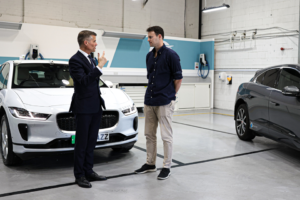The AV Act, highlighted in the King’s Speech, authorizes advanced technology to safely drive vehicles on British roads. The UK government says the self-driving technology regulation has the potential to unlock a £42bn industry and create 38,000 skilled jobs by 2035.
Central to the legislation is road safety, with automated vehicles expected to reduce human error; a factor that the UK government says is involved in 88% of road collisions. The law mandates that self-driving vehicles achieve safety standards comparable to those of careful and competent human drivers and undergo rigorous safety checks before being allowed on the roads. The aim is to reduce incidents related to drunk driving, speeding, fatigue and inattention.
Transport secretary Mark Harper said, “Britain stands at the threshold of an automotive revolution and this new law is a milestone moment for our self-driving industry, which has the potential to change the way we travel forever. While this doesn’t take away people’s ability to choose to drive themselves, our landmark legislation means self-driving vehicles can be rolled out on British roads as soon as 2026, in a real boost to both safety and our economy.”

The AV Act follows several self-driving trials across the UK. Companies such as Wayve and Oxa are already testing self-driving cars in London and Oxford. Wayve recently secured over US$1bn in investment to further develop its AI technology, supported by the UK’s code of practice for automated vehicle trialling.
From 2018 to 2022, the UK’s self-driving vehicle sector generated £475m in direct investment and created 1,500 jobs. The new law introduces a comprehensive legal framework, delineating liability for AVs and aiming to ensure independent incident investigation to promote continuous safety improvement.
Key industry figures have praised the new law. Paul Newman, founder and CTO of Oxa, emphasized the comprehensive scope and clarity of the AV Act: “The act gives the UK new momentum as developers like Oxa will need to comply with the world’s most comprehensive autonomous vehicle laws to deploy technology in vehicles here. Meeting the highest AV standards will make British companies global leaders with technology that is the safest and AI systems the most trusted – all key to building business and public trust in autonomy globally.”
Alex Kendall, co-founder and CEO of Wayve, also highlighted the UK’s leading role in regulating self-driving technology and its potential benefits for safety and sustainability.
Mike Hawes, chief executive of the Society of Motor Manufacturers and Traders (SMMT), said, “The industry will continue its close collaboration with government and other stakeholders to develop the necessary secondary legislation that will enable the safe and responsible commercial rollout of self-driving vehicles and the significant social and economic benefits they will afford the UK.”
Richard Cuerden, academy director at the Transport Research Laboratory (TRL), added: “TRL welcomes the AV bill and the ambitious direction it sets to improve transport. The automated technology, software and sensors and the business models to deliver new services are developing fast. By setting a regulatory framework, the government is providing the industry with confidence and motivation to continue [this] and we expect to increase investment in the UK in this growing sector.”
The legislation also supports broader goals of improving mobility and access to services, particularly in rural communities.The UK government says it aims to open up vehicle use to those previously unable to drive, with the intention of enhancing transport accessibility nationwide.


